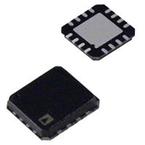●Product Details
●The ADA4932-1 / ADA4932-2 are the next generation AD8132 with higher performance and lower noise and power consumption. They are an ideal choice for driving high performance ADCs as a single-ended-to-differential or differential-to-differential amplifier. The output common-mode voltage is user adjustable by means of an internal common-mode feedback loop, allowing the ADA4932-1 / ADA4932-2 output to match the input of the ADC. The internal feedback loop also provides exceptional output balance as well as suppression of even-order harmonic distortion products.
●With the ADA4932-1 / ADA4932-2, differential gain configurations are easily realized with a simple external four-resistor feedback network that determines the closed-loop gain of the amplifier.
●The ADA4932-1 / ADA4932-2 were fabricated using the Analog Devices, Inc., proprietary silicon-germanium (SiGe) complementary bipolar process, enabling it to achieve low levels of distortion and noise at low power consumption.
●The low offset and excellent dynamic performance of the ADA4932-1/ADA4932-2 make them well suited for a wide variety of data acquisition and signal processing applications.
●The ADA4932-1 is available in a 16-lead LFCSP, and the ADA4932-2 is available in a 24-lead LFCSP. The pinouts are optimized to facilitate the printed circuit board (PCB) layout and minimize distortion. The ADA4932-1/ADA4932-2 are specified to operate over the −40°C to +105°C temperature range; both operate on supplies between +3 V and ±5 V.
●Applications
● ADC drivers
● Single-ended-to-differential converters
● IF and baseband gain blocks
● Differential buffers
● Line drivers
●### Features and Benefits
● High performance at low power
● High speed
● −3 dB bandwidth of 560 MHz, G = 1
● 0.1 dB gain flatness to 300 MHz
● Slew rate: 2800 V/μs, 25% to 75%
● Fast 0.1% settling time of 9 ns
● Low power: 9.6 mA per amplifier
● Low harmonic distortion
● 100 dB SFDR at 10 MHz
● 90 dB SFDR at 20 MHz
● Low input voltage noise: 3.6 nV/√Hz
● ±0.5 mV typical input offset voltage
● Externally adjustable gain
● Can be used with gains less than 1
● Differential-to-differential or single-ended-to-differential operation
● Adjustable output common-mode voltage
● See data sheet for additional features

 Part 3D Model
Part 3D Model
